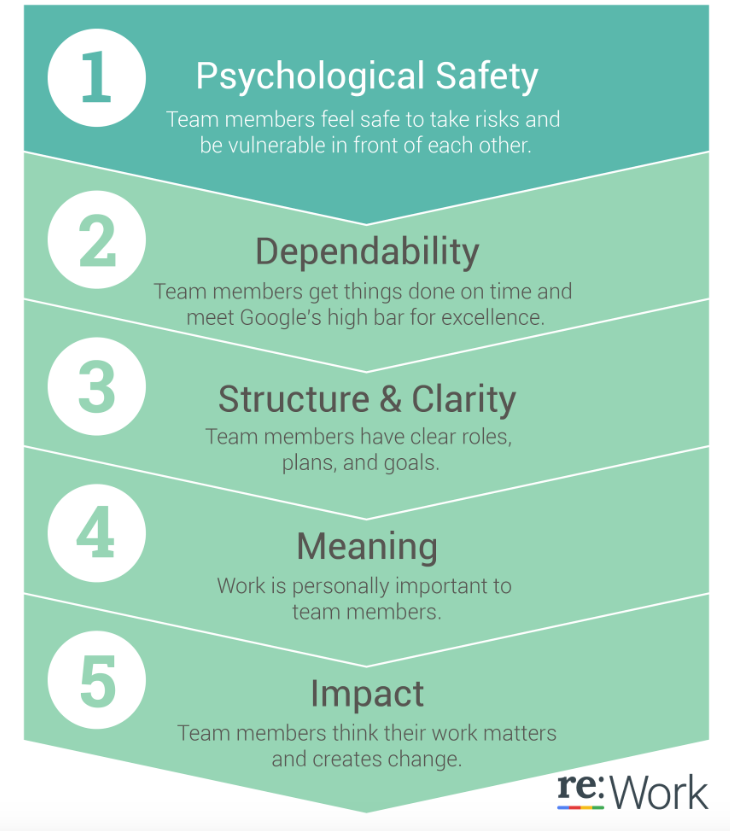You may have already heard of Google’s Project Aristotle. Back in 2012, Google set out to identify what made their most effective teams so much better than others. They wanted to reproduce that magic that some teams had across the company and so they interviewed 180 teams and collected all kinds of data.
They initially assumed that the difference would be in skill-sets or tooling or something of a technical nature. This is Google after all, where they prize technical accomplishments.
What they finally concluded after a significant amount of analysis was that the leading contributors to highly successful teams weren’t skill, or education, or tooling, or even who specifically was on the team.
The researchers found that what really mattered was less about who is on the team, and more about how the team worked together.

The report specifically called out these five items as being the key factors.
- Psychological safety: A strong team culture was correlated with each member’s perception of the consequences of taking an interpersonal risk. Those on teams with strong cultures feel safe taking risks in the face of being seen as ignorant, incompetent, negative, or disruptive. In a team with high psychological safety, teammates feel safe to take risks around their team members. They feel confident that no one on the team will embarrass or punish anyone else for admitting a mistake, asking a question, or offering a new idea.
- Dependability: On dependable teams, members reliably complete quality work on time (vs the opposite - shirking responsibilities).
- Structure and clarity: An individual’s understanding of job expectations, the process for fulfilling these expectations, and the consequences of one’s performance are important for team effectiveness. Goals can be set at the individual or group level, and must be specific, challenging, and attainable. Google often uses Objectives and Key Results (OKRs) to help set and communicate short and long term goals.
- Meaning: Finding a sense of purpose in either the work itself or the output is important for team effectiveness. The meaning of work is personal and can vary: financial security, supporting family, helping the team succeed, or self-expression for each individual, for example.
- Impact: The results of one’s work, the subjective judgement that your work is making a difference, is important for teams. Seeing that one’s work is contributing to the organization’s goals can help reveal impact.
This doesn’t mean that technical skills are unimportant; we can’t satisfy Dependability if we are delivering a poor quality product. This does mean that we can’t focus exclusively on technical skills and ignore all of those other intangibles. It turns out that intangibles have a greater impact than most people assume.
When the Agile manifesto was written, despite most of the signatories being significantly technical people themselves, they didn’t focus on technical points. They talked about individuals and interactions - about people and communication. They all knew that the technical parts were important but they also recognized that all the “human” pieces were just as important and that those things needed to be called out so they wouldn’t get lost.
Psychological Safety tops the list here for good reasons. While they call out the behavioural aspects of not having psychological safety, we also know that lacking that safety means that we don’t have full access to our prefrontal cortex, that part of our brain that does higher level, logical thinking.
Then if we consider the SAFETY model of psychological safety, we’ll see that several of the other items are also part of what’s required for psychological safety. The SAFETY model calls out Security, Autonomy, Fairness, Esteem, Trust, and You. Of those, Structure and Clarity fits into Security. Meaning fits into Esteem and possibly also touches Autonomy. Dependability fits into Trust.
In other words, just about everything here reinforces the importance of having psychological safety.
Coming back to our starting point, Project Aristotle was trying to determine how to maximize productivity in our teams. The most important factors are how we work together as a team, not who was on the team, and of those factors, having strong psychological safety is critical.

